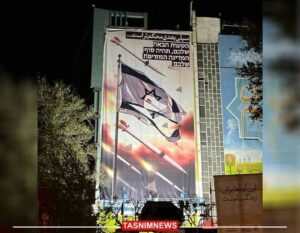[vc_row][vc_column][vc_column_text]In the seventies and eighties the PLO took advantage of the Lebanese civil war to establish terrorist cells in southern Lebanon, in order to carry out terrorist attacks against the villages near the border. In recent years, Hizballah has been taking advantage of the civil war in Syria and directed by Iran, have set up terrorist cells in order to open a second front against Israel from the Syrian border. Hizballah and Iran excuse their presence on the border, on the Syrian slopes of Mount Hermon, claiming that they intended to fight the Syrian rebels, who are members of the Al-Nusra Front, belonging to Al-Qaeda. These claims turned out to be fiction last week.
Four rockets were fired on August 20th 2015, from north of the Syrian Golan Heights, and landed in Israel; for the first time since 1973 rockets fired from Syria landed within 20km of the Upper Galilee. In response, the IDF’s most severe in recent years, 14 targets, including Syrian military command centers, armories, and weapon warehouses were attacked. With the assistance of intelligence information, Israel also attacked and killed the terrorists responsible for the rocket launch, who were 15 km behind the Syrian border. According to various reports, along with the terrorists Syrian and Iranian officers were also killed. Israel announced that the Palestinian Islamic Jihad, and Iran beyond it, launched the rockets to the Upper Galilee. More so, Israel holds the Assad regime – an ally of Iran -responsible, for it still controls the area from which the rockets were launched.
Why does Israel hold Iran and Syria responsible for the attack while it is clear to everyone that the Assad regime is no longer in control of the country like it once was. Why is Israel holding them responsible for what is happening on the border? Moreover, after several years of bloody war between Shiites and Sunnis in the region, Israel claims that a Sunni organization, the Palestinian Islamic Jihad, fired rockets at Israel under direction from the Shiite Iran. Something here doesn’t seem right.
Various jihadist organizations operating in the Middle East vary between complete denial of local-national identity (like ISIS); and activity in the name of the national identity to promote national rights, but with a religious agenda (such as Hamas and Palestinian Islamic Jihad). Unlike Europe, where nationalism has emerged with democratic and secular values, in the Middle East there is a constant attempt to reconcile national identity with the religious one. The best example is Hezbollah, who lives in a constant dilemma between its Shiite identity and the Lebanese one; between being a “Resistance” organization against the “occupation by the Zionist entity”, and on the other hand, being a part of the Shiite axis with Syria and Iran and, in fact, the long arm of the Ayatollahs regime in Tehran who seeks to spread the Shiite Islamic revolution throughout the region.
Obviously, another example is the Palestinian Islamic Jihad, which was established in the early eighties in the Gaza Strip, as an alternative to the secular PLO. This is a cruel terrorist organization responsible for hundreds of attacks against Israeli civilians. Except for Israel, even the US, UK, EU, Japan, Canada and Australia recognize it as a terrorist organization. The organization seeks to eliminate the State of Israel and establish in its place an Islamic state in Palestine. Over the years, the organization was supported by Iran, which has used it in the past as Proxy agents for terrorist activity against Israel. For example, in 2002, the PIJ infiltrated the Western Galilee, directed by Hezbollah, and committed acts of terror that left 6 Israelis dead.
The use of Palestinian organizations as proxies has been a familiar modus operandi for Iran and Hizballah over the last twenty years. It was assumed that the use of a “terrorist proxy” reduces the risks of major escalation which still perceived as undesirable. In addition, it targets the Israeli response against the Palestinian organizations while Hizballah, Syria and Iran remain unharmed. “Palestinian blood” has become a cheap commodity that can be used. It appears though as if this time the Israeli response was “a major snag” – as described by Islamic Jihad leaders themselves, who were quick to deny their involvement in launching the rockets.
The conflict between Shiites and Sunnis in the Middle East caused a crisis in the relationship between the Shiite axis and Hamas, but it seems as if the leadership of the PIJ remains loyal to its patron. Hours before the rockets were fired at the Galilee, a meeting was held in Rashidiya, a refugee camp near the city of Tire in South Lebanon. The meeting was led by the head of the Palestinian refugee camps desk in Hizballah and a representative of Amal, yet another Shiite party in Lebanon, with the leader of the PIJ in Lebanon. The meeting was apparently held to coordinate positions. For the Shiite axis it was important to revenge the assassination last July in northern Syria’s Golan Heights, which it attributed to Israel. Five active supporters of the Asad regime were killed. Despite initial reports that two Hizballah troops were also killed in the attack, it appears that due to the uncomfortable timing, on the eve of confirmation the nuclear deal with Iran, Hizballah had to downplay their involvement in the incident, which appears to add extra motivation to use the proxy form PIJ for the purpose of revenge.
However, let us not be mistaken, there aren’t any shared interests between equal parties. Iran as the dominating party, and Hizballah as the strongest organization in the region are exploiting the weakness of the Palestinian organizations, and the PIJ, for his part, finds Iran a convenient patron. Hizballah’s use of Palestinian organizations, allegedly in contradiction with the Shiite-Sunni struggle, allows it to attack Israel without taking responsibility for its actions. This is a tactic that has often been used in the past. On the other hand, the Palestinian issue pales in comparison to the bloody wars throughout the Middle East. Wars that revolve around religious identity rather than nationality. Arab news sites broadcast images from the various arenas: Yemen, Syria, Iraq and Iran’s nuclear dossier. The Palestinian issue is losing altitude. This may explain the willingness of organizations such as PIJ to fire rockets at Israel, for the first time from Syria, in order to revitalize the Palestinian issue on the Middle Eastern agenda. This attempt failed, of course, in light of Israel’s vigorous reaction against both the launchers and the Syrian regime. Two days after the Israeli response, the Arab news sites returned to deal with issues that concern the Arab-Muslim world today.
The bottom line is that the rocket launch is part of the dialogue between Israel and Iran through Hezbollah, over the past two years. Israel insists on its red lines set recently regarding the conflict in Syria: it will not tolerate the transfer of strategic weapons from Syria to Lebanon; and it will not allow a second front in the Golan Heights, while Hizballah is trying to overstep these boundaries without letting the situation deteriorate into war. In doing so, the organization chose the last year and a half to break the balance of deterrence created after the Second Lebanese War in 2006, and to respond to acts attributed to Israel on the border with Syria or Lebanon. This dialogue, taking place in the language of the Middle East, is conducted indirectly and words are only one communication tool. Advertising IDF’s new strategy document followed by a visit of the Israeli prime minister and defense minister to the northern command, releasing statements that Israel will defend its citizens and will harm those who wish to harm her are both a response to the repeated attempts by Hizballah to take advantage of the chaotic situation in the Syrian Golan Heights and establish an infrastructure of terror against Israel. The rockets fired at Israel were as revenge for the actions against these terrorist infrastructures, attributed to Israel, and both sides understand the language: Who is responsible for what and why…
Looking ahead, as long as the money continues to flow to the two warring parties in Syria: the Shiite Assad regime and Sunni extremist groups, it will be difficult to reach a cease-fire. For Israel this means, first and foremost, another restless border that requires dealing with more security challenges. Israel will continue to strive for deterrence and prevention as the main measures to confront these challenges, not only to prevent acts of terrorism on the border, but also to prevent escalation and costly confrontation.
Finally, on a personal note, as a resident of the Galilee, I was delighted to find that despite recent tensions, daily life in northern Israel remains as usual. Families, many travelers and tourists continue to visit the wide range of attractions in the Golan Heights and Galilee. The Israelis do not see these unusual events a reason to change their vacation plans.
Sources:
- he.wikipedia.org
- almanar.com.lb #1
- almanar.com.lb #2
- almanar.com.lb #3
- thenewkhalij.com
- ynet.co.il
- channel 10
- channel 2
[/vc_column_text][/vc_column][/vc_row]





